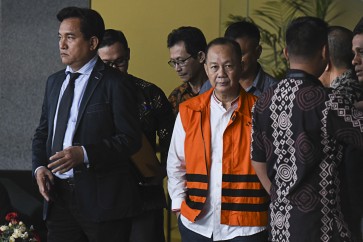Pursuing big, bad debtors requires more than political resoluteness
But strong political will alone is not enough for the task force, which has until the end of 2023 to complete its task of collecting long overdue debt repayments from former bank owners who received Bank Indonesia liquidity support (BLBI) during the 1998 economic and political crises.
Change Size
 Under investigation: Syafruddin Arsyad Temenggung, former chairman of the Indonesian Bank Restructuring Agency (IBRA), and his lawyer Yusril Ihza Mahendra (left), leave the Corruption Eradication Commission (KPK) building after an questioning in this photo file. (Antara/Hafidz Mubarak A.)
Under investigation: Syafruddin Arsyad Temenggung, former chairman of the Indonesian Bank Restructuring Agency (IBRA), and his lawyer Yusril Ihza Mahendra (left), leave the Corruption Eradication Commission (KPK) building after an questioning in this photo file. (Antara/Hafidz Mubarak A.)
T
he political condition is now more supportive and the political will is much stronger for pursuing the big, bad debtors who had allegedly owed the government an estimated Rp 110 trillion (US$7.8 billion) over the last 23 years.
The powerful inter-ministerial debt collection task force, which includes four ministers and the chief of the National Police and the Attorney General’s Office, proves it.
But strong political will alone is not enough for the task force, which has until the end of 2023 to complete its task of collecting long overdue debt repayments from former bank owners who received Bank Indonesia liquidity support (BLBI) during the 1998 economic and political crises.
The most fundamental question is: What is the legal condition and foundation that the government did not have over the past 20 years but that it now possesses and can use to recover the assets from the “bad debtors” without violating laws and breaching legally binding debt settlement contracts signed in late 1998 and closed before the Indonesian Bank Restructuring Agency (IBRA) ended its operation in February 2004.
The question about the legality of the debt collection campaign is relevant because the debts were related to distressed assets hurriedly assessed for securities and hurriedly acquired during the 1998 peak of the economic, notably banking, crisis.
When the government dumped 71 financially distressed banks into the IBRA during the height of the crisis in mid-1998, the agency also took over more than Rp 340.72 trillion in 372,930 bad loans and almost Rp 360 trillion in other forms of distressed assets.
However, after the agency verified the documents and the value of the assets, it found out that quite a number of the assets were not adequately backed up with legal documents and that their value had been steeply inflated. Worse still, many of the bad loans had not been adequately secured with collaterals.

















